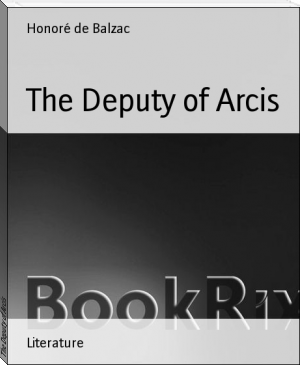The Deputy of Arcis - Honoré de Balzac (little red riding hood read aloud TXT) 📗

- Author: Honoré de Balzac
Book online «The Deputy of Arcis - Honoré de Balzac (little red riding hood read aloud TXT) 📗». Author Honoré de Balzac
paper, rusty nails, and put them carefully into his pocket. That,
he informed me, is a marked symptom well known to those who study
the first stages of insanity. Enticing him to the subject of their
conversations in Florence, he obtained the fact that the poor
fellow meditated suicide, and the reason for it. Every night,
Gaston told him, his wife appeared to him, and he had now resolved
to _rejoin_ her, to use his own expression. Instead of opposing
this idea, Lord Lewin took a tone of approval. "But," he said,
"men such as we ought not to die in a common way. I myself have
always had the idea of going to South America, where, not far from
Paraguay, there is one of the greatest cataracts in the world,
--the Saut de Gayra. The mists rising from it can be seen at a
distance of many miles. An enormous volume of water is suddenly
forced through a narrow channel, and rushes with terrific force
and the noise of a hundred thunder-claps into the gulf below.
There, indeed, one could find a noble death."
"Let us go there," said Gaston.
"Yes," said Lord Lewin, "I am ready to go at once; we must sail
from England; it will take a few weeks to get there."
In this way, madame, he enticed our poor friend to England, where,
as you will already have supposed, he has placed him in charge of
Doctor Ellis, who, they say, has not his equal in Europe for the
treatment of this particular form of mental aberration.
I joined them at Beauvais, and have followed them to Hanwell,
taking care not to be seen by Marie-Gaston. Here I shall be
detained until the doctor is able to give a decided opinion as to
the probable results of our friend's condition. I greatly fear,
however, that I cannot possibly return to Paris in time for the
opening of the session. But I shall write to the president of the
Chamber, and in case any questions regarding my absence should
arise, may I ask Monsieur de l'Estorade to do me the favor of
stating that, to his knowledge, I have been absolutely forced by
sufficient reasons to absent myself? He will, of course,
understand that I ought not to explain under any circumstances the
nature of the affair which has taken me out of the country at this
unlucky time; but I am certain it will be all-sufficient if a man
of Monsieur de l'Estorade's position and character guarantees the
necessity of my absence.
I beg you to accept, madame, etc., etc.
As Madame de Camps finished reading the letter, the sound of a carriage entering the courtyard was heard.
"There are the gentlemen," said the countess. "Now, had I better show this letter to my husband or not?"
"You can't avoid doing so," replied Madame de Camps. "In the first place, Nais will chatter about it. Besides, Monsieur de Sallenauve addresses you in a most respectful manner, and there is nothing in the letter to feed your husband's notion."
"Who is that common-looking man I met on the stairs talking with Nais?" said Monsieur de l'Estorade to his wife, as he entered the salon.
As Madame de l'Estorade did not seem to understand him, he added,--
"He is pitted with the small-pox, and wears a maroon coat and shabby hat."
"Oh!" said Madame de Camps, addressing her friend; "it must be the man who was here just now. Nais has seized the occasion to inquire about her idol."
"But who is he?" repeated Monsieur de l'Estorade.
"I think his name is Bricheteau; he is a friend of Monsieur de Sallenauve," replied Madame de Camps.
Seeing the cloud on her husband's brow, Madame de l'Estorade hastened to explain the double object of the organist's visit, and she gave him the letter of the new deputy. While he was reading it, Madame de l'Estorade said, aside, to Monsieur de Camps,--
"He seems to me much better, don't you think so?"
"Yes; there's scarcely a trace left of what we saw this morning. He was too wrought up about his work. Going out did him good; and yet he met with a rather unpleasant surprise at Rastignac's."
"What was it?" asked Madame de l'Estorade, anxiously.
"It seems that the affairs of your friend Sallenauve are going wrong."
"Thanks for the commission!" said Monsieur de l'Estorade, returning the letter to his wife. "I shall take very good care not to guarantee his conduct in any respect."
"Have you heard anything disagreeable about him?" asked Madame de l'Estorade, endeavoring to give a tone of indifference to her question.
"Yes; Rastignac has just told me of letters received from Arcis, where they have made the most compromising discoveries."
"Well, what did I tell you?" cried Madame de l'Estorade.
"How do you mean? What _did_ you tell me?"
"I told you some time ago that the acquaintance was one that had better be allowed to die out. I remember using that very expression."
"But _I_ didn't draw him here."
"Well, you can't say that I did; and just now, before I knew of these discoveries you speak of, I was telling Madame de Camps of another reason why it was desirable to put an end to the acquaintance."
"Yes," said Madame de Camps, "your wife and I were just discussing, as you came in, the sort of frenzy Nais has taken for what she calls her 'preserver.' We agreed in thinking there might be future danger in that direction."
"From all points of view," said Monsieur de l'Estorade, "it is an unwholesome acquaintance."
"It seems to me," said Monsieur de Camps, who was not in the secret of these opinions, "that you go too fast. They may have made what they call compromising discoveries about Monsieur de Sallenauve; but what is the value of those discoveries? Don't hang him till a verdict has been rendered."
"My husband can do as he likes," said Madame de l'Estorade; "but as for me, I shall drop the acquaintance at once. I want my friends to be, like Caesar's wife, beyond suspicion."
"Unfortunately," said Monsieur de l'Estorade, "there's that unfortunate obligation--"
"But, my dear," cried Madame de l'Estorade, "if a galley-slave saved my life, must I admit him to my salon?"
"Oh! dearest," exclaimed Madame de Camps, "you are going too far."
"At any rate," said the peer of France, "there is no need to make an open rupture; let things end quietly between us. The dear man is now in foreign parts, and who knows if he means to return?"
"What!" exclaimed Monsieur de Camps, "has he left the country for a mere rumor?"
"Not precisely for that reason," said Monsieur de l'Estorade; "he found a pretext. But once out of France, you know--"
"I don't believe in that conclusion," said Madame de l'Estorade; "I think he will return, and if so, my dear, you really must take your courage in both hands and cut short his acquaintance."
"Is that," said Monsieur de l'Estorade, looking attentively at his wife, "your actual desire?"
"Mine?" she replied; "if I had my way, I should write to him and say that he would do us a favor by not reappearing in our house. As that would be rather a difficult letter to write, let us write it together, if you are willing."
"We will see about it," said Monsieur de l'Estorade, brightening up under this suggestion; "there's no danger in going slow. The most pressing thing at this moment is the flower-show; I think it closes at four o'clock; if so, we have only an hour before us."
Madame de l'Estorade, who had dressed before the arrival of Madame de Camps, rang for her maid to bring her a bonnet and shawl. While she was putting them on before a mirror, her husband came up behind her and whispered in her ear,--
"Then you really love me, Renee?"
"Are you crazy, to ask me such a question as that?" she answered, looking at him affectionately.
"Well, then, I must make a confession: that letter, which Philippe brought--I read it."
"Then I am not surprised at the change in your looks and manner," said his wife. "I, too, will make you a confession: that letter to Monsieur de Sallenauve, giving him his dismissal,--I have written it; you will find it in my blotting-book. If you think it will do, send it."
Quite beside himself with delight at finding his proposed successor so readily sacrificed, Monsieur de l'Estorade did not control his joy; taking his wife in his arms, he kissed her effusively.
"Well done!" cried Monsieur de Camps, laughing; "you have improved since morning."
"This morning I was a fool," said the peer of France, hunting in the blotting-book for the letter, which he might have had the grace to believe in without seeing.
"Hush!" said Madame de Camps, in a low voice to her husband, to prevent further remarks. "I'll explain this queer performance to you by and by."
Rejuvenated by ten years at least, the peer of France offered his arm to Madame de Camps, while the amateur iron-master offered his to the countess.
"But Nais!" said Monsieur de l'Estorade, noticing the melancholy face of his daughter, who was looking over the stairs at the party. "Isn't she going too?"
"No," said the countess; "I am displeased with her."
"Ah, bah!" said the father, "I proclaim an amnesty. Get your hat," he added, addressing his daughter.
Nais looked at her mother to obtain a ratification, which her knowledge of the hierarchy of power in that establishment made her judge to be necessary.
"You can come," said her mother, "if your father wishes it."
While they waited in the antechamber for the child, Monsieur de l'Estorade noticed that Lucas was standing up beside a half-finished letter.
"Whom are you writing to?" he said to his old servant.
"To my son," replied Lucas, "who is very impatient to get his sergeant's stripes. I am telling him that Monsieur le comte has promised to speak to his colonel for him."
"True, true," said the peer of France; "it slipped my memory. Remind me of it to-morrow morning, and I'll do it the first thing after I am up."
"Monsieur le comte is very good--"
"And here," continued his master, feeling in his waistcoat pocket, and producing three gold pieces, "send that to the corporal, and tell him to drink a welcome to the stripes."
Lucas was stupefied. Never had he seen his master so expansive or so generous.
When Nais returned, Madame de l'Estorade, who had been admiring herself for her courage in showing displeasure to her daughter for half an hour, embraced her as if they were meeting after an absence of two years; after which they started for the Luxembourg, where in those days the Horticultural Society held its exhibitions.
VII. THE WAY TO MANAGE POLITICAL INTRIGUES
Toward the close of the audience given by the minister of Public Works to Monsieur Octave de Camps, who was presented by the Comte de l'Estorade, an usher





Comments (0)